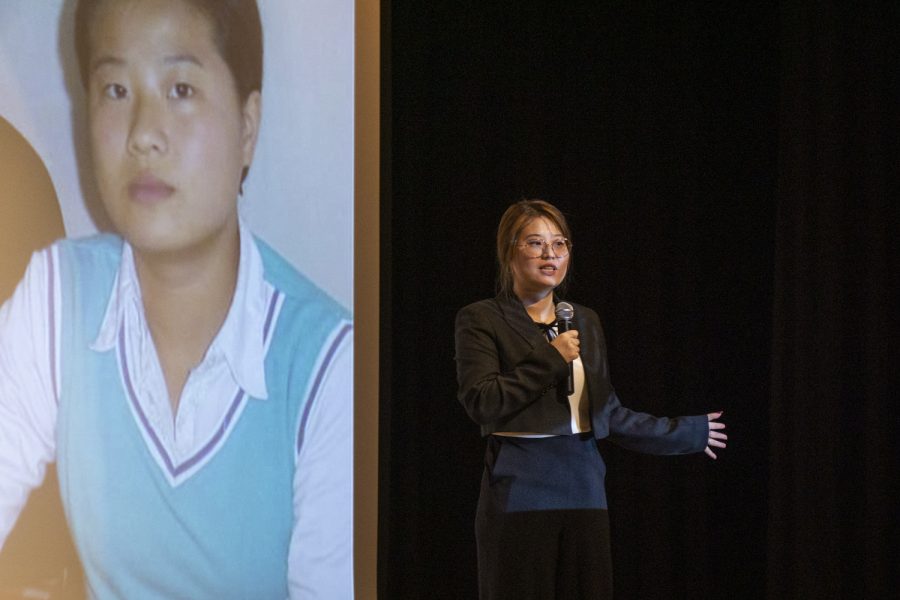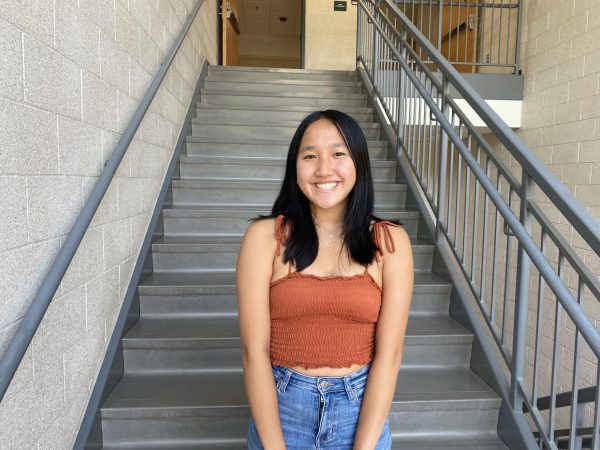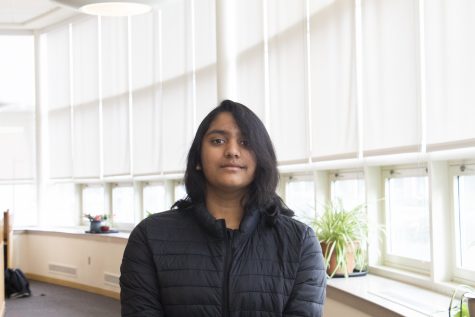Refugee shares story of life in North Korea
Guest speaker Grace Jo talks about the hardships of her childhood in North Korea at an assembly on Feb. 7.
February 13, 2023
North Korean refugee Grace Jo visited Algonquin on Feb. 7 to discuss her experiences growing up in North Korea, fleeing to China and ultimately finding refuge in America.
Jo was born in North Korea during the Great Famine of the ’90s to a middle-class family and lived in a small village in the mountains. She fled the country when she was seven years old and stayed in China for 10 years before escaping to the United States. During her time in North Korea, Jo endured starvation, threats and loss of family members at the hands of the oppressive government.
“Our middle class family, we were not able to get the supplies from the government,” Jo said. “We had to find our own way to survive in the country. But because of the law and regulations, because of the travel bans, all the things that applied to our country, we were not allowed to travel to different cities to bring goods to the city and sell it without any permission…In the beginning, we struggled a lot and we were starving, and we were drinking only cold water for 10 days, without any food.”
Social studies teacher Gina Johnston invited Jo to speak after guest speaker Daniel Di Martino’s February 2022 presentation about socialism in Venezuela had sparked controversy.
“Last year, people didn’t believe how bad socialism is in Venezuela,” Johnston said. “When [Di Martino] was speaking, we had people that were like, ‘oh, it’s not that bad in Venezuela.’ But when you talk about North Korea, everyone knows their government is really bad to their people.”
While juniors were required to attend Jo’s presentation, it was open for all students who were interested in listening. Johnston believes all students can benefit from hearing stories like Jo’s.
“Human rights issues should cover every curriculum,” Johnston said. “When it’s something as a human rights violation, I think any teacher can bring their students; it’s okay to miss a day of class.”
One of Jo’s earliest memories was when her father illegally crossed the Chinese border for food from their distant relatives, having to swim over the Tumen river for bags of rice. Once government officials found out about these trips, Jo’s life began to change forever.
“The third time [he crossed the border], when he returned the next morning, one of the people in the village found out, and they reported my father to the government,” Jo said. “My father got caught and sent to the local detention center and my mother got caught and she was also in the detention center. And those officers…they were collecting everything and taking it away from us.”
As time went on, Jo lost more family members; her oldest sister went missing trying to find food, her baby brother and grandmother died of malnutrition and her father was shot by officials while attempting to escape the detention center. After enduring loss after loss, Jo’s mother decided there had to be better opportunities out there.
“They were not welcoming us anymore in that village,” Jo said. “They wanted to kick us out, and they were saying, ‘I will give you 15 days’ notice, and after 15 days, if you guys are still living in this house, I will burn this house down.’ That was the last word my mom heard from officials, and that completely broke my mom’s heart. My father and my mother were so loyal to our government in the beginning, and they only knew the government and how to work hard for the government. But later on, she decided that was not a country we can live in anymore because what a country, they’re kicking us out of the village because we were trying to survive and the only crime was bringing one bag of rice from China.”
In the wake of her mother’s realization, Jo, her mother and her sister fled to China. According to Jo, she first realized the difference between life in North Korea and the rest of the world after seeing a dog.
“He was fed by one of the big containers, mixed with white rice and pork meat soup,” Jo said. “The dog was smelling it a little bit and he didn’t like it, so he was standing there…when I saw that moment, I was so curious about this world. What is this world? Where is this place? We were fighting so hard; my father died and we were trying to look for food so hard, and my brother and my grandmother died without one single potato to eat. But that dog doesn’t like to eat that white rice and meat soup, and the owner is giving that good rice and meat soup to the dog.”
The Chinese government constantly searched for, caught and forcefully sent refugees, like Jo, back to North Korea – a process called repatriation. Jo was repatriated and imprisoned in China twice, and she received the initial encouragement to share her story during one of these prison stays.
“I was in the Chinese prison for 13 months and I met so many ladies,” Jo said. “One of the ladies, she came to me and told me…it’s time for them to go back to North Korea, so they’re going back, but they know they will not be able to survive and come back again. But she had a feeling that I would survive. So she said, ‘if you go out from this difficult moment and have freedom, please tell the world that North Koreans are suffering and dying. And even though I will die, I will not regret it because people will remember us.’”
Johnston hopes students will be inspired by Jo’s message and use it to expand their worldviews.
“Hopefully they learn what life is like beyond our borders,” Johnston said. “Like, I’ve traveled to Mexico, but none of us can travel to North Korea. And they can’t travel here. So it would be amazing for [students] just to take one thing and go, oh my goodness…we’re just so used to our life that we have no idea about the world beyond ours.”
Currently, Jo attends Savannah College of Art and Design and is majoring in interior design.
“I’m hoping to become a great interior designer later and go back to my country and rebuild the villages and cities,” Jo said.
Jo urges students to hear her story and cherish their rights.
“[In America,] I can dream about my future life. I can dream about my future career and this is the freedom and liberty it can give to us,” Jo said. “Please protect the freedom in your country.”











